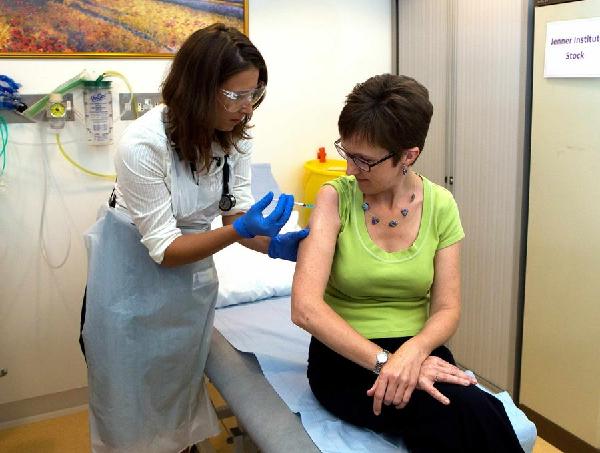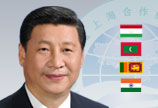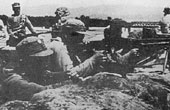First UK volunteer gets experimental GSK Ebola shot in trial
(Agencies) Updated: 2014-09-18 15:58LONDON - The first volunteer in a fast-tracked British safety trial of an experimental Ebola vaccine made by GlaxoSmithKline received the injection on Wednesday, trial organisers said.
|
|
| Volunteer Ruth Atkins receives an injection of the Ebola vaccine, at the Oxford Vaccine Group Centre for Clinical Vaccinology and Tropical Medicine (CCVTM) in Oxford, southern England September 17, 2014. [Photo/Agencies] |
The candidate Ebola vaccine, which GSK co-developed with the US National Institutes of Health, has also been given to 10 volunteers taking part in a similar separate trial in the United States, and so far there were no signs of any serious adverse reactions, doctors said.
 |
| US to begin Ebola hospital equipment lift to Liberia |
Since the shot contains no infectious Ebola virus material, only one of its genes, experts say there are no concerns that any of the subjects will contract the deadly disease.
Latest data from the World Health Organisation (WHO) show about 2,500 people have died of Ebola in an outbreak that started in March and has infected almost 5,000 people in Guinea, Sierra Leone, Liberia and Nigeria.
Dr. Anthony Fauci of the National Institute of Allergy and Infectious Diseases told a US Senate panel on Tuesday that "no red flags" indicating serious adverse reactions have been found in the 10 healthy volunteers vaccinated there so far.
The trials are seeking to determine not only whether the vaccine is safe, or causes adverse side effects, but also whether it triggers the production of antibodies against the Ebola virus.
Professor Adrian Hill, a vaccine researcher at the Jenner Institute at Oxford University who is leading the trial, said the volunteer - a 48-year-old former nurse - had experienced no problems since she was given the vaccine early on Wednesday and was "doing very well at her two-hour check".
The aim is to recruit a total of 60 people for the UK trial and complete the tests by the end of 2014, after which the vaccines could be deployed on an emergency basis.
Study data from an animal trial of an Ebola vaccine similar to this one showed that it was effective for at least five weeks in lab monkeys but required boosting with an additional vaccine to extend its protection to 10 months.
Hill said he has no shortage of volunteers, with some 200 people having contacted him so far. These are being screened, he said, to make sure they fit the required age and health profiles, and to ensure they are able to return for a total of nine check-ups over the duration of the trial.
"I'm pretty confident that the safety is going to be ok, but the big question is, will it work? In other words, will the immune response that we get be strong enough to prevent Ebola infection?" Hill said in a telephone interview.
"We need to find out whether what works in monkeys also looks good in humans."
GSK says it plans to begin making up to about 10,000 doses of the vaccine at the same time as the initial clinical trials, so that if they are successful, the vaccine could be made available immediately for an emergency immunisation programme.
Ben Neuman, a virologist at the University of Reading who is not involved in the vaccine studies, said it was important not to get ahead of the results.
"There is clearly a need for this vaccine, but what is not clear is whether it will work well enough to protect someone from Ebola," he said.
He said the experimental shot "uses some of the best available technology to give the immune system a good long look at its target, a small but vitally important part of the virus", but added: "We won't really be able to tell whether the vaccine works until it is tested on the ground in West Africa."
- Liberia hopes US Ebola pledge will spur others to act
- US to begin Ebola hospital equipment lift to Liberia
- China vows again to help fight Ebola
- Ebola survivor: No time to waste as Obama ups aid
- US to assign 3,000 troops to fight Ebola
- WHO welcomes China's contribution of mobile laboratory to west africa against Ebola











